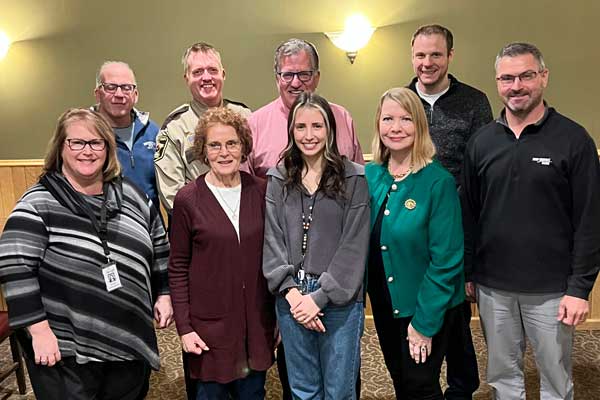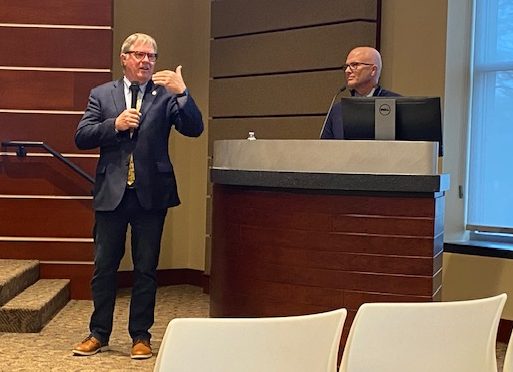Scott County Attorney Ron Hocevar is teaming with a statewide anti-child trafficking organization and local law enforcement agencies to form the south metro area’s first task force focusing on child sexual exploitation.
Hocevar’s office has joined forces with Jessica Bartholomew, executive director of the nonprofit Anti Child Trafficking United (A.C.T.) and former undercover police officer specializing in human trafficking and narcotics investigations. Together they are leading the task force focusing on sexual exploitation crimes against children and will host a community awareness forum on Thursday, Oct. 23, at Prior Lake High School from 7 to 8:30 p.m.
Hocevar has witnessed many changes in the types of crimes prosecuted by his office in the past 25 years, including the rise in child exploitation cases. Hocevar said child sexual exploitation is often the most underreported and perpetrators are masterful at preying on their victims.
Online sexual exploitation, commonly known as sextortion, has reached crisis levels in the past few years, prompting the Federal Bureau of Investigation, Homeland Security and the Minnesota Department of Public Safety to issue alerts to local law enforcement agencies, Hocevar said. Studies showed crimes against children ages 9 to 17 involved mostly boys. There were 22 confirmed deaths by suicide of teen victims in one year, according to Hocevar, adding that the Minnesota Bureau of Criminal Apprehension received over 9,000 reports of sextortion in 2023.
The problem continues to grow. Following the Covid pandemic in 2020, sextortion cases increased significantly throughout the country. Online learning and socializing with friends became the norm for much of that year with children spending a significant amount of time each day on the internet. Technology allowed predators to connect socially with children, and the “second pandemic” evolved from online child sexual exploitation, according to Hocevar.
“There’s a camera in every young person’s pocket,” he said. “We live in a sexually exploitative culture promoted by movies, media and in music.”
Bartholomew acknowledged it’s easy for predators to pose as someone much younger and go “catfishing,” the term used for establishing a fake profile to lure someone into a trusted relationship through online communication. Once the child’s trust is gained, the predator may ask them to send pictures of themselves or share explicit photos or a video which can be uploaded to the internet. Predators can also turn out to be a trusted adult or family member who use the relationship to acquire such photos. The child may fear reprisal if they tell someone or feel they will not be believed.
Many predators pose as teenagers, according to Hocevar, who said a recent case his office handled involved a third-grader who unknowingly was communicating with a 50-year-old man who lived in another country. In those instances, his office can do nothing to prosecute the alleged criminal other than to lobby for the online site to be shut down.
“In 2024, technology advancements including artificial intelligence and meta encryption have put more children and teens at risk of online sexual exploitation,” Hocevar said. “Law enforcement officials are already receiving victim reports of AI-altered and generated child sexual images and videos. This was non-existent years ago.”
He advised parents to be vigilant in looking at how their child is using their phone or tablet. The sites viewed frequently by children usually differ greatly than what is being accessed by adults.
There are currently close to 250 documented websites on which explicit photos of children have been posted, Hocevar said. He recommended parents and children have open and nonjudgmental conversations about what is appropriate and what is off limits, including discussion on new social media and gaming sites that are constantly being created that appeal to kids. That’s oftentimes where predators search for their next victim.
“Kids don’t realize the permanence of the web and parents shouldn’t be afraid of having those hard discussions,” he said. “If they find their child has been exploited, it should be reported immediately. We always stress to victims that they are victims and it’s not their fault.”
Bartholomew said school staff members are regularly the eyes and ears when exploitation is first suspected. The result can be a change in a child’s behavior, including bullying, depression and declining performance in class. She has conducted professional development courses for teachers and nurses, while also leading discussions during parent awareness sessions focusing on child exploitation.
The Oct. 23 information meeting is open to all and will address current laws involving sextortion, AI, advice on what parents should do if their child has been exploited, current trends, prevention tools and information on survivor support groups. The free event is being co-sponsored by the Shakopee Police Department, Savage Police Department, Belle Plaine Police Department, The Link, Minnesota BCA, Scott County Attorney’s Office, A.C.T. United and Southern Valley Alliance.
“AI is and will continue to be a huge issue,” Hocevar said. “New applications will continue to be developed and it’s hard for parents to keep up with new and changing technology. Today is the poorest AI will ever be.”












